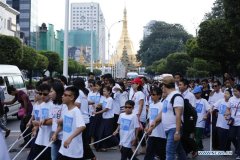Health of world's youth damaged by inaction, underfunding: A
MELBOURNE, May 10 (Xinhua) -- Two Australian professors believe the health and well-being of the current generation of youth has been damaged by decades of government underinvestment.
In response to the global trend of adolescent neglect, the University of Melbourne experts, Professor George Patton and Professor Susan Sawyer, will chair an international inquiry in London, beginning on Tuesday (Australian time).
Patton and Sawyer's study on the general health of the world's population aged 10-24 -- estimated to be 1.8 billion people -- was published on Tuesday in the Lancet, one of the most respected academic journals in the world.
The Melbourne researchers found adolescents and young adults were the most overlooked demographic in terms of health-resource care.
They noted that 10-24-year-olds -- especially those in developing counties -- were confronted with a unique set of health issues, including HIV and AIDs, early pregnancy, unsafe sex, depression, self-harm, high unemployment, obesity, violence and exposure to alcohol.
Patton, who runs the Murdoch Children's Research Institute and Melbourne Royal Children's Hospital's Center for Adolescent Health with Sawyer, said as a result, adolescence was a challenging stage in people's lives.
"Puberty triggers a cascading process of brain development and emotional change that continues through to the mid-20s," Patton told Pursuit, University of Melbourne's multi-media platform, on Tuesday.
"But because adolescence is generally thought to be the healthiest time of life, young people have attracted little interest and too few resources."
"Indeed, adolescents aged 10 to 24 years have the poorest health care coverage of any age group."
The comprehensive report sourced the perspectives of public health workers, economists, politicians and behavioral, neurological and social scientists.
From there views, the authors made a raft of recommendations aimed at promoting general health for global youth.
But rather than simply funding the health sector, the experts agreed that -- above all else -- free secondary education was the best way of ensuring less young people fell into these traps.
"The single best investment we can make is guaranteeing access to free, quality secondary education," Patton said.
"Every year of education beyond the age of 12 is associated with fewer births for adolescent girls and fewer adolescent deaths for boys and girls. A healthy, educated workforce has the potential to shape a country's economic prospects."
Patton and Sawyer will be joined by 30 world-leading experts from 14 counties as well as two young health advocates for the Lancet Commission.















